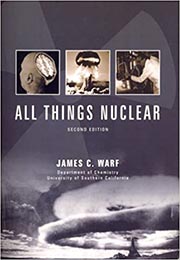All Things Nuclear
by James C. Warf
Reviewed November 28, 2005
 One difficultly in teaching nuclear issues to university level students is selecting a textbook that offers a wide range of topics. "All Things Nuclear" by Dr. James Warf was written to fill this need. To quote the book: "...Science is much too important to be left only to scientists." With this in mind, Dr. Warf has authored a book that covers a wide range of topics including nuclear medicine, power, and nuclear weapons. The book, 732 pages in length is now in its second edition. The book begins by chronicling the milestones of the discoveries in atomic physics, which then lays a historical and scientific foundation for any student to understand the development of the nuclear age.
One difficultly in teaching nuclear issues to university level students is selecting a textbook that offers a wide range of topics. "All Things Nuclear" by Dr. James Warf was written to fill this need. To quote the book: "...Science is much too important to be left only to scientists." With this in mind, Dr. Warf has authored a book that covers a wide range of topics including nuclear medicine, power, and nuclear weapons. The book, 732 pages in length is now in its second edition. The book begins by chronicling the milestones of the discoveries in atomic physics, which then lays a historical and scientific foundation for any student to understand the development of the nuclear age.
Dr. Warf then provides the reader with an excellent account of nuclear science. Although it may be complex for a traditional non-science major, it is clear enough for most to grasp.
The book then examines the biological effects of ionizing radiation, as well as its role in fighting cancer and other peaceful uses of radioactivity. So often students of nuclear issues focus on either weapons or reactors. These chapters help give a wider perspective of "All Things Nuclear."
The book continues with an in depth review of nuclear power and its consequences including nuclear waste and proliferation of nuclear technology. Readers will be given a solid foundation of the technology and the larger issues of nuclear power, including looking at various power issues and their impact on the environment.
Dr. Warf concludes the survey by discussing the issue of nuclear weapons, their effects and the arms race. This section also gives an excellent overview of the development of each of the nuclear powers. This section encompasses about a third of book, and is a good reference of nuclear weapons.
My only criticism of the book was the clear opinions offered on certain topics. I did not expect to find this in a textbook. However, a teacher could leverage this to a wider discussion of the topic within the classroom. This fact is balanced by Dr. Warf's personal anecdotes of his involvement in the nuclear age. This will give readers a "human-side" of this incredible saga and keeps the information from being just a story of events years ago with people who have died.
Overall, if instructors are looking for a general survey test on the nuclear age, one should consider "All Things Nuclear".